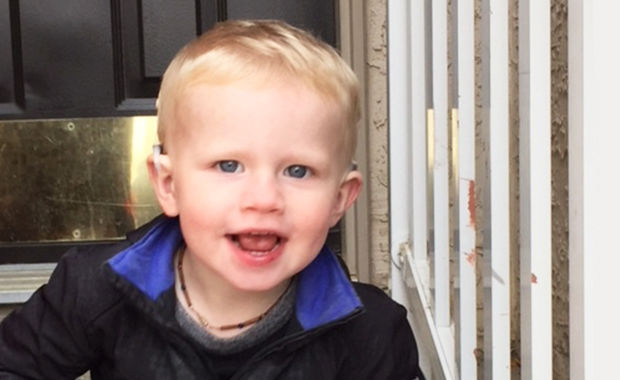What Would You Do If Your Baby Couldn’t Hear?
Education and Advocacy Get your babies hearing checked early as screens in Canada are not mandatory and your child may be missing a necessary diagnosis.

Aimee Lewis was at the end of her rope. Her 2-year old son Beckett, wasn’t responding and Lewis felt she couldn’t communicate with him. “It seemed like he just wasn’t listening, I couldn’t correct him or call him for his attention. He would ignore me. It was very frustrating.”
Beckett was mostly non-verbal and unbeknownst to his mother, unable to hear her singing to him at night. Lewis began to wonder if her son’s behaviour was within the normal range for his age. “It felt like we were missing something,” she recalls, “so we booked a hearing test.”
In April 2017, Beckett was diagnosed with severe hearing loss. Initial screening for hearing loss should be done between birth and one-month of age. But at the time, there was no provincially mandated early hearing detection and intervention program in Saskatchewan, where the family lived.
It should have happened much earlier. Unlike the United States, Canada does not have a nationally-mandated infant screening program. Each year, more than 2,000 Canadian children are born with hearing loss, making it one of our country’s most common birth defects. Some provinces have screening rates lower than 20 percent, while others lack a process or policy for intervention, meaning that a child’s ability to communicate may depend on where they happen to be born.
All babies need support
The Hearing Foundation of Canada (THFC) launched a campaign last May to advocate for a national infant hearing mandate. The campaign garnered over 12,000 signatures and was brought forward in Parliament by Peter Julian, M.P. of New Westminster—Burnaby, in June 2017.
Since then, Saskatchewan has announced an investment of $523,000 for infant hearing screening in their 2018 budget. This is an important first step, but intervention is also crucial. It’s hoped that all future provincial budgets will include essential early intervention to ensure access to language — spoken language and/or sign language — which is critical for brain development in the early months of life.
We need a national strategy
Once tested, Lewis felt an immediate sense of relief for Beckett. He received cochlear implants last August, and his life was transformed. “We are excited to hear Saskatchewan has decided to test all babies, but what steps do they have in place to help those [who] have learnt that their child is deaf?” asks Lewis. “I would love to see social workers and other resources in place.”
It’s been nine months since Beckett’s implant was activated and he’s doing extremely well. Lewis credits the Saskatchewan Pediatric Auditory Rehabilitation Center and the team that worked with Beckett for his progress. “It has been so amazing to watch him discover music for the first time and watching him drum out the beat,” she says.
THFC will continue to advocate for mandates around infant hearing on both the federal and provincial level, so that every child in Canada has an equal chance at reaching their full potential, with no child left behind.
